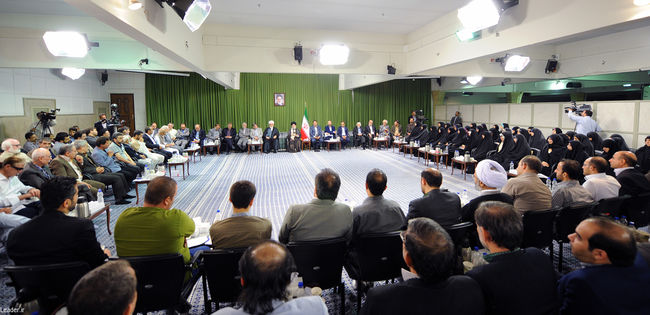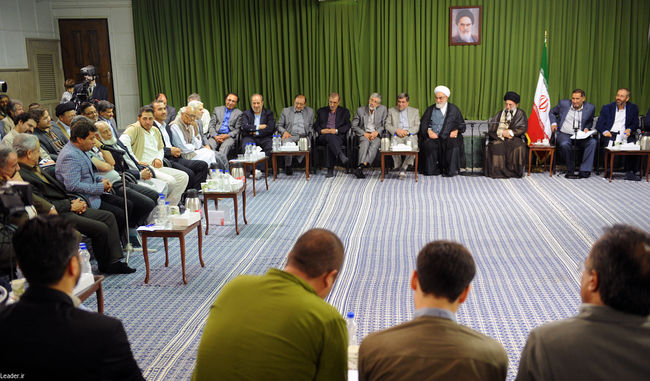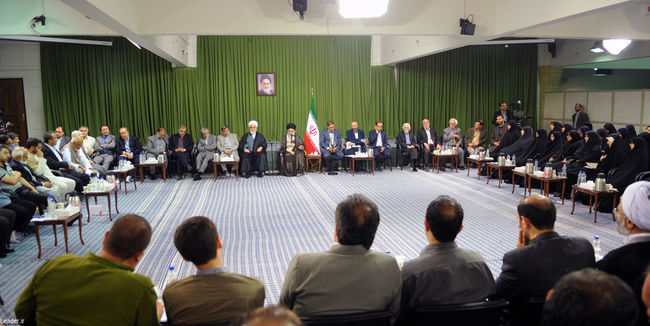On the eve of the auspicious anniversary of the birthday of Imam Hassan Mojtaba (Peace be upon him), Leader of the Islamic Revolution Ayatollah Seyyed Ali Khamenei received a group of Iranian cultural figures, young as well as veteran poets, and professors of the Persian literature along with poets from India, Pakistan, Afghanistan, Tajikistan and Azerbaijan.
In this meeting, Ayatollah Khamenei offered his congratulations on the blessed birthday of Imam Hassan Mojtaba, the second Shia Imam, saying the unique influence of poetry leaves heavy responsibilities on poets’ shoulders. Underscoring the necessity for honorable poetry to openly defend good against evil and against the dominance of the latter’s propaganda apparatus in the world, the Leader said: “The poetry of revolution is poetry in the same direction and at the service of the objectives of the revolution, which are justice, humanity, unity, national eminence the all-out progress of the country and training of mankind.”
Referring to the possibility of using the influential tool of poetry for two contradictory purposes, i.e. either “leading the audience on the right path” or “misleading the audience to the wrong path”, Ayatollah Khamenei said: “Today, with the expansion of new media tools, some hands are determined to strip the poetry of youth off its soft, sentimental, epic and revolutionary nature and use poetry to serve an unbridled culture which does not comply with human norms and which is under the influence of sexual desires, personal gains and praise for oppression.
Heaping praise on some young poets for their perseverance in this poisonous atmosphere, Ayatollah Khamenei said: “This perseverance symbolizes the very sense of duty and today any poetry which is against oppression and in line with the objectives of the Islamic Ummah, including [poetry] about Yemen, Bahrain, Lebanon, Gaza and Palestine, and Syria is the symbol of wise poetry.”
To that effect, the Leader said calling for “neutrality on the part of poets in the conflict between good and evil” is meaningless, noting: “If poets and artists remain neutral vis-à-vis the war between good and evil, they will be squandering their God-given talent and if they serve the evil front, they will be committing treason and crime.”
Ayatollah Khamenei also touched on the anniversary of the chemical bombing of the Iranian border city of Sardasht in 1987 by the Iraqi Baathist regime, saying the oppression endured by the Iranian nation is an important and shocking example to be reflected across the globe in poetry. Ayatollah Khamenei said: “The world media which are dominated by the US, Britain and Zionists and which sometimes raise a hue and cry for saving an animal, brazenly remain silent vis-à-vis these crimes and similar ones like the ongoing bombing of Yemen and the invasion of Gaza and Yemen over the past years.”
Addressing poets, the Leader raised the following question: “What should an honorable man do vis-à-vis such position-taking and wickedness?”
Ayatollah Khamenei said rapid reaction by young poets to events and developments is a very good and valuable move, saying: “We hope that the poetry of revolution, which is in fact serving the objectives and ideals of the revolution, i.e. justice, humanity, unity, national eminence, the country’s all-out progress and training of human beings, will make progress day by day.”
Ayatollah Khamenei expressed satisfaction with the considerable progress in Iran’s poetry after the 1979 Islamic Revolution, saying poetry in Iran enjoys more potential than what it currently does, given its brilliant background and its important historic points. “The institutions in charge, including state organs, [authorities in] the domain of arts and the Islamic Republic of Iran Broadcasting (IRIB) should fulfill their tasks in this regard.”
At the beginning of his speech, the Leader of the Islamic Revolution called on everyone to benefit from the blessings of the holy fasting month of Ramadan, purify their hearts, pray for divine forgiveness and reflect upon prayers revealed during Ramadan.
At the start of this meeting, more than 20 poets recited their poems to the Leader of the Islamic Revolution.
In this meeting, Ayatollah Khamenei offered his congratulations on the blessed birthday of Imam Hassan Mojtaba, the second Shia Imam, saying the unique influence of poetry leaves heavy responsibilities on poets’ shoulders. Underscoring the necessity for honorable poetry to openly defend good against evil and against the dominance of the latter’s propaganda apparatus in the world, the Leader said: “The poetry of revolution is poetry in the same direction and at the service of the objectives of the revolution, which are justice, humanity, unity, national eminence the all-out progress of the country and training of mankind.”
Referring to the possibility of using the influential tool of poetry for two contradictory purposes, i.e. either “leading the audience on the right path” or “misleading the audience to the wrong path”, Ayatollah Khamenei said: “Today, with the expansion of new media tools, some hands are determined to strip the poetry of youth off its soft, sentimental, epic and revolutionary nature and use poetry to serve an unbridled culture which does not comply with human norms and which is under the influence of sexual desires, personal gains and praise for oppression.
Heaping praise on some young poets for their perseverance in this poisonous atmosphere, Ayatollah Khamenei said: “This perseverance symbolizes the very sense of duty and today any poetry which is against oppression and in line with the objectives of the Islamic Ummah, including [poetry] about Yemen, Bahrain, Lebanon, Gaza and Palestine, and Syria is the symbol of wise poetry.”
To that effect, the Leader said calling for “neutrality on the part of poets in the conflict between good and evil” is meaningless, noting: “If poets and artists remain neutral vis-à-vis the war between good and evil, they will be squandering their God-given talent and if they serve the evil front, they will be committing treason and crime.”
Ayatollah Khamenei also touched on the anniversary of the chemical bombing of the Iranian border city of Sardasht in 1987 by the Iraqi Baathist regime, saying the oppression endured by the Iranian nation is an important and shocking example to be reflected across the globe in poetry. Ayatollah Khamenei said: “The world media which are dominated by the US, Britain and Zionists and which sometimes raise a hue and cry for saving an animal, brazenly remain silent vis-à-vis these crimes and similar ones like the ongoing bombing of Yemen and the invasion of Gaza and Yemen over the past years.”
Addressing poets, the Leader raised the following question: “What should an honorable man do vis-à-vis such position-taking and wickedness?”
Ayatollah Khamenei said rapid reaction by young poets to events and developments is a very good and valuable move, saying: “We hope that the poetry of revolution, which is in fact serving the objectives and ideals of the revolution, i.e. justice, humanity, unity, national eminence, the country’s all-out progress and training of human beings, will make progress day by day.”
Ayatollah Khamenei expressed satisfaction with the considerable progress in Iran’s poetry after the 1979 Islamic Revolution, saying poetry in Iran enjoys more potential than what it currently does, given its brilliant background and its important historic points. “The institutions in charge, including state organs, [authorities in] the domain of arts and the Islamic Republic of Iran Broadcasting (IRIB) should fulfill their tasks in this regard.”
At the beginning of his speech, the Leader of the Islamic Revolution called on everyone to benefit from the blessings of the holy fasting month of Ramadan, purify their hearts, pray for divine forgiveness and reflect upon prayers revealed during Ramadan.
At the start of this meeting, more than 20 poets recited their poems to the Leader of the Islamic Revolution.



